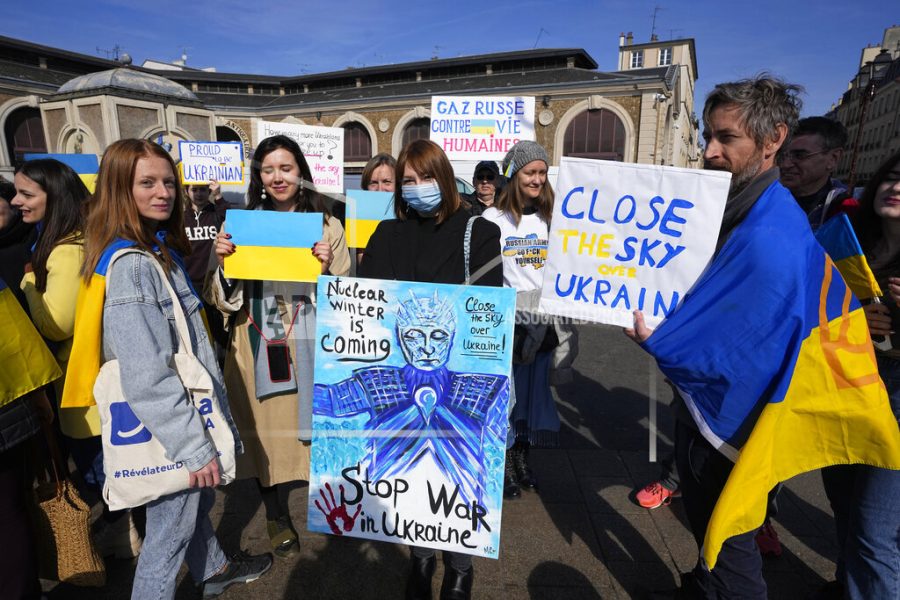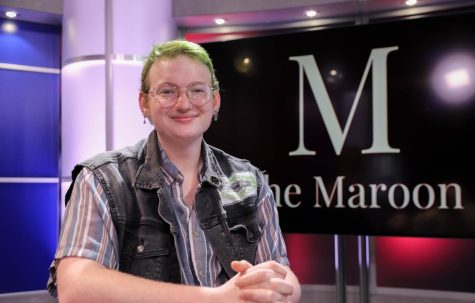Study abroad students react to tensions in the Ukraine
A group of Ukrainian protesters demonstrate near the Chateau de Versailles, where a European Union summit will take place, Thursday, March 10, 2022 in Versailles, west of Paris. With European nations united in backing Ukraine’s resistance with unprecedented economic sanctions, three main topics now dominate the agenda: Ukraine’s application for fast-track EU membership; how to wean the bloc off its Russian energy dependency; and bolstering the region’s defense capabilities. (AP Photo/Michel Euler)
March 24, 2022
With the situation in Ukraine becoming increasingly hostile, the university is closely monitoring study abroad operations. While there are no students currently studying abroad in Eastern Europe, students in Europe are feeling the effects of the war through travel restrictions and protests.
“At this point, we’re just waiting,” psychology junior studying in the Netherlands Jasmine Pierce said. “We’re hoping for the best, but we’re all preparing for the worst.”
Mariette Thomas, director of the center of international education, said that at this time, the university has no concerns about student safety for those abroad, though the university is watching the situation carefully. No students have expressed concerns about their safety, but they said that tensions are high and protests are frequent on and off campus.
The university advised students to avoid travel to Russia and the Ukraine on January 26, and the advisory remains in place. The U.S. Department of State has also issued a level four travel advisory for Russia and the Ukraine and has asked all American citizens to leave the countries immediately.
Currently, the war has not intersected with any Loyola study abroad programs and all study abroad programs are scheduled to continue as originally planned,Thomas said. Students are not restricted from traveling outside of their host countries, though they are advised to register their travel plans with the Department of State’s Smart Traveler Enrollment Program and download the AlertTraveler app to stay up to date on current travel advisories. Until further notice, students are advised to not travel to Eastern Europe, according to Thomas.
“While there is no indication that we will need to make adjustments to the delivery of our programs, the last two years have taught us to be prepared for anything,” Thomas said.
Despite international tensions, the center for international education is urging students to continue to take advantage of all that study abroad has to offer. Students are encouraged “whenever possible, [take] the opportunity of traveling abroad to better understand the geopolitical context of the invasion,” according to an email sent to students studying abroad from Thomas.
Thomas encouraged students studying abroad experiencing distress about the war to seek mental health resources through their travel medical insurance. For current Loyola students planning to study abroad, Thomas directed them towards the University Counseling Center.
Some students studying abroad said that the war feels jarringly close to home, while others still feel a level of distance. Although no students are in countries that are experiencing direct impacts, they said that there’s a level of anxiety, but also a strong sense of comradery.
“It’s the complete opposite of apathy,” Pierce said. “It may be because we’re in Europe and we can see it, but it affects a lot of us here.”
Pierce said that in the Netherlands, there’s a focus on solidarity and providing aid for Ukraine. She said that there are protests almost daily, demanding justice for the Ukrainian citizens. Ella Murphy, political science junior also studying in the Netherlands, said that they talk about Ukraine frequently in her classes, but she feels more distance from the war as an American.
“There are protests in Amsterdam daily, but I don’t feel the same effects as Europeans and people that are closer,” Murphy said.
Alexandra Zengel, criminology and philosophy junior in France said she’s not very worried about global war, but she’s concerned about the citizens of Russia and the Ukraine.
“I have a few Russian friends and none of them are interested in the war,” Zengel said. “Are the Russian people really being heard?”








